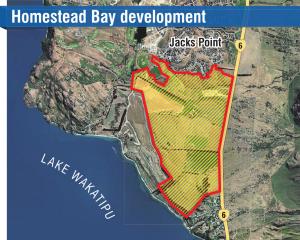
The Bill will be drafted to establish a 5% levy on all short-term accommodation in the district, and is expected to be introduced to Parliament by Clutha-Southland MP Hamish Walker in the first half of next year.
The levy would raise about $22.5 million a year to help ease the burden of infrastructure on the district's ratepayers.
Urban Development Minister Phil Twyford said yesterday Queenstown was the ''jewel in the crown of New Zealand's tourism destinations'' and had faced significant growth pressure and increasing visitor numbers, putting a ''huge strain'' on infrastructure.
''It's now up to [the council] to consider their options to progress work on the levy.''
While Cabinet has agreed for government officials to work with the Queenstown Lakes District Council to draft the Bill, the final decision is dependent on the proposal that is drafted.
Queenstown Lakes Mayor Jim Boult said if re-elected he would take an ''overriding interest'' in the draft Bill, but it would be prepared by council chief executive Mike Theelen and his staff.
He was ''very pleased'' the proposal had progressed to this point and hoped it would be passed before next October's general election.
''It remains a sensible solution for our district and it's taken three years' work, but certainly with the support of Government I'm now confident it will [become a reality].
''Quite honestly ... it's taken a lot of sweat and blood.
''I think the other thing that needs to be realised in this is that this is a signal that Government has realised Queenstown Lakes is special and it needs special legislation.''
A district-wide, non-binding referendum on the issue in June had a 42% turnout and more than 81% of voters were in favour.
Queenstown Chamber of Commerce chief executive Anna Mickell said it was ''great progress'' to get the proposal to this point and was pleased it was coming back to the local community for the detailed work.
''There is a lot of sophistication in the implementation that we now need to start work on.
''Hotel pricing is complicated and it's not easy - it's all doable, but it's going to require that all of us ... get together and really make sure that we land this as equitably as possible across the accommodation sector, and as smartly as possible, so we collect the right amount of money and reduce any impact to the consumer and to the accommodation providers who are charged with collecting it.''
However, mayoral candidate and Villa del Lago hotel owner Nik Kiddle - who established the Lakes District Tax Equity Group to lobby against the proposed levy - said the accommodation sector would like a more ''sensible, broader-based option'' in which all beneficiaries of tourism contributed, not just the accommodation sector.
That would also ''pick up the full amount the community is looking to recover from visitors''.
''We're still hoping that we can get a discussion of a broad-based tax under way, both at a local level and at the national level.''
The New Zealand Hotel Owners Association was not supportive of the levy as proposed and its chairwoman Lani Hagaman said ''more taxes are not the solution''.
''It really was inevitable that the Government would agree to have a look at what's possible, but the proposed levy is a long way from actually being introduced as a Bill to Parliament and [the association] will continue to make its position known throughout the process.
''The Government recently introduced a new international visitor levy ... If you keep on repeatedly clipping the ticket, soon enough there will be no ticket left.''
Visitor levy process
- QLDC and government officials will draft the Local Bill on proposed visitor levy.
- Clutha-Southland MP Hamish Walker will introduce it to Parliament.
- A Local Bill is a piece of legislation for a specific geographical area.
- Expected to be introduced in either the first or second quarter of next year.
- The Bill needs to pass three readings — after the first it would go to a select committee, after the second it would go to a committee of the whole House, and only after passing the third would it be presented to the Governor-General for Royal Assent, at which point it would become an Act of Parliament.












